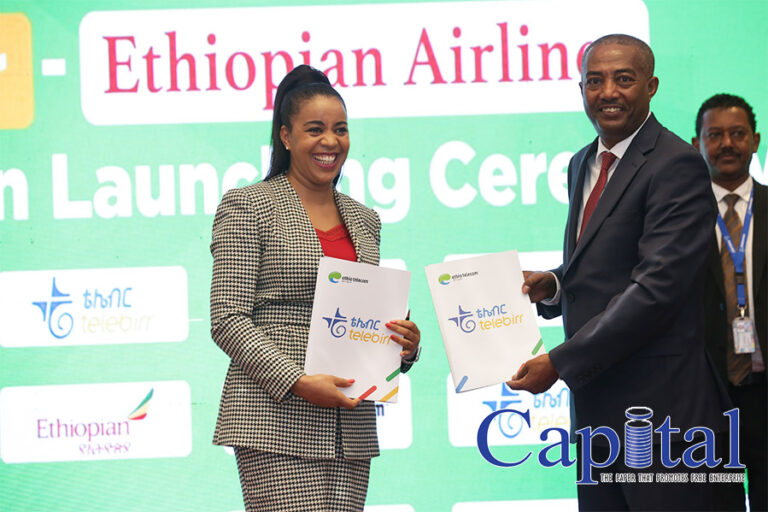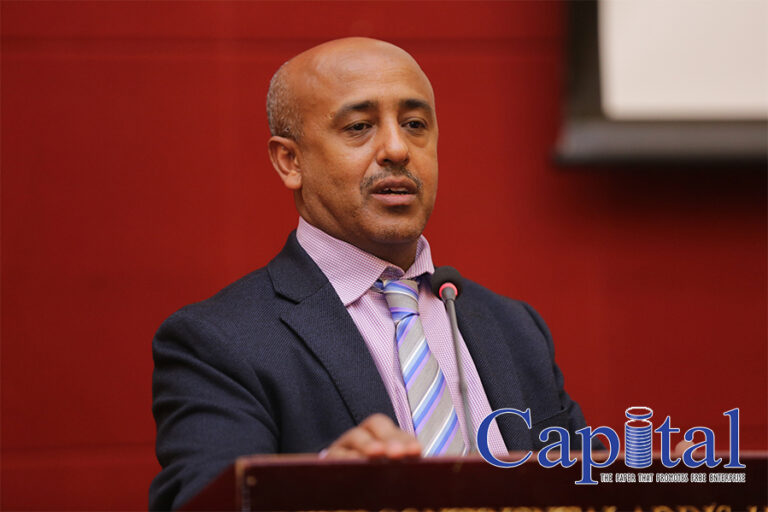Ethio telecom applies for a license to the National Bank of Ethiopia to start giving loans and saving services through telebirr as part of expanding its digital financial service.
“We are working to strength the digital economy in order to enable citizens to have an easy system whilst promoting financial inclusion,” said Firehiwot Tamiru, CEO of Ethio telecom. The CEO indicated that Ethio telecom is waiting the permit which is said to be issue soon.
To ensure the existence of various online payment options, on Wednesday April 20, 2022, the telecommunications firm signed an agreement with Ethiopian airlines on domestic flights ticket online purchasing system through telebirr.
“E-money service is playing a pivotal role in fostering the digital economy that the nation aspires to achieve along with improving our community’s digital payment system experience and in modernizing the existing customary cash transactions of institutions’ payment systems,” expressed Firehiwot.
Chief Commercial Officer of Ethiopian Airlines, Lemma Yadecha, who signed the agreement on behalf of the airline, said that the airline had challenges making transactions of over 30,000 birr round trip. He said now it has become possible to make direct sales for the stated amount.
The payment system integration agreement signed between the two government enterprises and the major revenue earners for the Ethiopian government would enable the Ethiopian Airlines’ passengers to have access to flight ticket online purchasing service at any time and everywhere using telebirr.
With few days left to mark its one year anniversary, following its launch in May 2021, telebirr has been able to garner a customer base of 17.6 million.
Through the year over 12.58-billion-birr local money transfer or transaction has been undertaken; while over half a million USD (528.4 thousand dollars) financial transfer has been made via telebirr from 34 countries in cooperation with eight international telebirr remittance partners with in only 5 months.
Telebirr now has 353 shops and through 80 master agents, 64,000 agents and over 16 thousand merchants service rendering partners and is also integrated with 12 commercial banks to render financial transfer service via the platform.
So far, over 52 institutions including traffic penalty payments, have integrated their services with telebirr to operate their businesses online, collect monthly bills and provide a number of online services to their customers. Furthermore, Ethio Telecom has already made the necessary preparations to integrate telebirr payment system with more than 20 governmental and non-governmental organizations and will soon officially launch the service accordingly.
“Enabling various business transaction payments ranging from making payments for small transaction to transferring large amount of money via telebirr, has significantly contributed to the adoption of digital payment system,” remarked the firm’s CEO in recent settings.
Tele applies for license to dish out loans
Bamboo shelters proposed to refurbish Lalibela churches
Lalibela projects led by Agence Française de Développement /AFD/ propose bamboo made shelters for the Lalibela rock-hewn churches to replace the old metal shelters set by UNESCO.
The eleven rock-hewn churches in Lalibela, which has been designated a UNESCO World Heritage site in 1978 have existed for almost a millennium. The United Nations, Educational, Scientific and Cultural Organization /UNESCO/ lead an effort in 2008 with help from the European Union to launch the project and built the industrial shelters which covered and protected several of the churches at risk.
Despite four protective shelters being erected over five of the rock-hewn churches with the aim to protect them from weathering, in particular water infiltration from the roofs; this project, have encountered several problems with its design and construction, and has caused controversy among the local community. Similarly, questions about the success of the project have been raised from time to time.
“Defining a sustainable solution for the protection of a World heritage site such as Lalibela required a very deep multi-disciplinary feasibility study. The results of the diagnosis showed the necessity to cover not only the churches but also the courtyards. Thus, it is necessary to remove the metal shelter,” said Feven Tewolde, Lalibela Project Manager, adding that a canopy option was selected as most conducive.
According to the project’s feasibility study, this option consists covering the churches and their courtyards with continuous structure resembling a light organic bamboo covered with waterproof membrane or canvas.
“Given the ownership of the project to the local community both construction and maintenance of the project will involve local resource and labor,” said Feven.
As Feven elaborates, although three alternative shelters have been proposed, UNESCO has been informed of this possibility on its 44th annual meeting held in July 2021, to which the organization has given its agreements in principle while requesting a detailed architectural design with heritage impact assessments, environmental and social impacts assessments including the final design.
Currently, the project is working to hire a company to do these various assessments, and is expecting to present the results on the 2023 UNESCO annual meeting. The conservation work is expected to start after the approval of UNESCO.
Initially presented as temporary, the metal shelters which have been a matter of concern to the World Heritage Committee since the project’s introduction in 2006, now represent a challenging issue affecting the churches and community of Lalibela.
Many residents and religious leaders of Lalibela town have complained repeatedly that the metal rods are causing immense damage to the ancient world heritage sites.
In 2018 UNESCO has also sent its advisory mission to Lalibela and stressed the necessity to remove the shelters after the necessary conservation works to the churches are carried out
In 2019, Ethiopia, under the initiative of Prime Minister Abiy Ahmed, requested support from the French authorities in the management of Ethiopian national heritage, and especially on the site of the churches in Lalibela, to which the French rose to the call.
President Emmanuel Macron of France in his first official trip to Ethiopia on March 2019 met Prime Minister Abiy Ahmed in Lalibela, and expressed support for PM Abiy’s ambitious reforms and diplomatic peace efforts during the Prime Minister’s Paris visit last October. To this end, the French president promised France would help Ethiopia restore the UNESCO registered heritages of Lalibela churches. A bilateral project aiming to conserve, restore and enhance the touristic experience was born.
The first stage of the project was the performance of a feasibility study which was set to define the most appropriate solution for the long-term conservation of the churches. This also include the restoration of the cracks and damages and to that end a training will be given to local craftsmen and Ethiopian heritage specialists, so that the country will be in the capacity to continue restoring alone the site. The project also incorporates urgent restoration and exhibition activities. The exhibition was set to first be presented in the Lalibela cultural center and then moved to Addis Ababa before finally becoming a traveling international exhibition.
Cut directly from the volcanic rock of the area, the churches have attracted foreign attention. Recently, new attention is being given to the churches in an attempt to save them from deterioration that threatens both the structural integrity of the buildings and the priceless artwork inside.
Inflation peaks a third higher than previous March
According to the Ethiopian Statistics Service’s monthly inflation data for March 2022, the general inflation has seen highs of 34.7 percent when compared to a similar period of last year.
During the month under evaluation, prices have been on a sharp rise and according to the report there has been a slight increase in the price of vegetables.
Teff, wheat, maize, beans, peas, shrimp and lentils and sorghum showed price increase in most cases, as, milk, cheese and eggs, and spices (mainly salt and pepper) cooking oil and butter slightly increased in the current month. In addition coffee beans and non-alcoholic beverages prices have also increased continuously.
On the other hand, the non-food index inflation in March 2022 has shown an increase of 23.5 percent. The rise in non-food inflation was mainly due to rise in the prices of alcohol and tobacco, stimulants (chat), clothing and footwear, housing repair and maintenance (house rent, cement and corrugated iron sheets), and energy (firewood and charcoal), furniture and home furnishings, fuel, medical care and jewelry (gold).
According to the report, the February 2022 country level CPI has increased by 34.7 percent as compared to March 2022.
The country level food inflation increased by 43.4 percent as compared to the one observed a year ago while non-food inflation rate increased by 23.5 percent in March 2022 as compared to the one observed in March 2021.
The total inflation in March 2022 stood 4.0 percent higher than in February 2022, while the Food index increased by 4.3 percentage points. At the same time, non-food inflation Increased by 3.4 percentage points.
Economists say a shortage of products, containers, rising shipping costs, the Western-led war in Ukraine and Russia, and subsequent rising oil prices, as well as food shortages for wheat and oil, are exacerbating global and domestic food prices.
Exporters push to reap untapped benefits of transferable LC
Exporters claim that the country is losing big on hard currency that can be generated from exporting commodity through the transferable letter of credit (LC) scheme.
On the flipside, experts in the banking system argue that a strong capacity and proper due diligence plays a vital role when exposing the Ethiopian market to such a scheme.
Exporters that Capital spoke to regarding the matter explained that they indeed have trading partner like buyers and suppliers of commodities mainly agriculture commodities. However, they are not able to facilitate the trading because the financial system of the country does not allow for a transferable LC in financial its scheme.
Addisu Alemayehu, a prominent researcher and market expert on species, herbs and related agricultural commodities and export, explained that he once got the opportunity to export commodity to India from other African countries. However, he could not capitalize on the opportunity because of the system in the country.
“One of my customers in India requested me to supply a pulse and spice, while ample supply of the two products was very limited in Ethiopia, I used my well established network that I got because of my role on the sector for the past several decades which led me to get the products in Tanzania and west Africa. My customer from India was happy to get the products through my channel but I wasn’t able to facilitate the product because transferable LC is not permitted in Ethiopia,” Addisu explained his experiences on the issue that has hindered his business endeavor.
“If I were able to facilitate the trading both I and the country would stand the chance to get at the bare minimum a dollar per kg from exporting the two commodities. However that has not come to pass,” Addisu, who is also founder and board secretary of the Ethiopian Spices, Aromatic and Herbs Growers and Processors Association (ESAHGPA) told Capital.
“I was trying to communicate with the regulatory body at the National Bank of Ethiopia, but the short response I got from them is that a transferable LC is not allowed in Ethiopia,” he added.
Experts agreed that the country should opt for new dimensions to expand the export trade and earnings. They said that sometimes foreign buyers that have long established trade relations with Ethiopian exporters simply demand to get more commodities through their channel which presents quite the stretch when the commodity may not necessarily be produced in Ethiopia and or instances when the product shortage is seen locally.
Experts explained that through the transferable LC scheme, exporters facilitate the consignment from their partners in other African countries that are mainly new for the commodities which Ethiopia exports for years to foreign buyers in other parts of the world.
On the scheme, Ethiopian traders open LC for the commodity holder in other African country and the commodity receivers in the other part of the world shall open LC for Ethiopian customers. As per the process, the Ethiopian trader settle the payment for the African partner and he or she directly exports the commodity for instance in India and the final buyer or importer settles the whole agreed payment to the Ethiopian trader when the shipment arrives at the set destination.
“It is common in other countries where the emerging economies are using the scheme to boost their commerce,” experts said.
“In Ethiopia we may communicate with exporters in Singapore, Dubai or other major trading hubs for import of commodities that these countries are not actually producing. We may finalize the trading at Dubai but the commodity shipment may be in other Asian countries or ports in different corridors in the world, but when it come for Ethiopian traders this is not allowed,” experts said while justifying the need for opening up the scheme to the Ethiopian market.
Experts in the financial sector like Dereje Zebebne, President of Zemen Bank, appreciated the concept as he indicated how the country stands the chance to benefit from the scheme in term of hard currency generation and acceleration in financial transactions. On the flipside though, the banking sector guru also warned that the scheme might offer bad consequences.
He explained that knowing both supplier and importer very well is the pillar on such an approach.
Dereje explained that trust and long-established partnership is crucial whilst doing business in this manner but more than that prudent analysis and study on commodity receivers that may have cost, is mandatory.
“On my view pure due diligence is a must to make money and generate foreign currency on transferable LC, the scheme in itself is a highly risky business,” Dereje told Capital.
The banking expert believes that it shall be workable but insisted that trust of counterparts and the background for the supplier and importer are a basic foundational piece to complete the jig-saw puzzle of a successful scheme.
He said that the trading partner here must have tangible and trusted documents like financial capability, reputation, and reliability in terms of settling payments for the commodity buyer, which is crucial. “But the regulatory body is the right authority to explain the reason why it is not allowed for Ethiopia,” he said pushing the case to NBE to evaluate the situation.
Dereje reminded that on the import side, banks in Ethiopia are opening LC for importers on similar approach, “intermediaries let’s say that are based in Dubai know the suppliers or manufacturers very well.”





